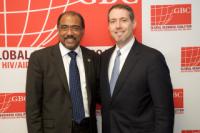
UNAIDS Executive Director, Michel Sidibé and John Tedstrom, President & CEO of GBC. 15 March 2010, New York . Credit: UNAIDS
On 15 March 2010, UNAIDS Executive Director, Michel Sidibé met with more than 15 private sector companies affiliated with the Global Business Coalition on AIDS, Tuberculosis and Malaria (GBC). Mr Sidibé highlighted UNAIDS’ priorities for 2010-11 and reiterated his call for the virtual elimination of mother-to-child transmission by 2015.
Across the world, each year more than a million pregnant women risk passing along HIV to their child. In 2008, approximately 45% of pregnant women known to be living with HIV received antiretroviral drugs to prevent HIV transmission to their children.
Ending mother-to-child transmission is everyone’s business and I urge the private sector to leverage their core competencies, resources and advocacy muscle to prevent all babies from becoming infected with HIV.
UNAIDS Executive Director Michel Sidibé
“Ending mother-to-child transmission is everyone’s business and I urge the private sector to leverage their core competencies, resources and advocacy muscle to prevent all babies from becoming infected with HIV” said Mr Sidibé.
The impact of AIDS on the labour force impacts both the public and private sectors. The epidemic is eroding productivity at a time developing countries need to become more competitive to cope with rapid globalization. In the private sector, this raises the costs of doing business and deters investment.
The virtual elimination of mother-to-child transmission would tackle one of the three ways of transmission of HIV (sexual, blood related and vertical). It also represents a positive difference on the health of women and children contributing to Millennium Development Goals 4, 5 and 6. Above all, it is doable in a business time frame i.e. by 2012 in the 13 highest burden countries and globally by 2015.
UNAIDS is convinced that mother-to-child transmission is an issue that the private sector can effectively tackle. The private sector has core competencies which can be of use: financial and accounting skills, technical know-how, understanding of communications products, marketing and selling of products and services, and valuable knowledge to reach and change opinions and behaviours of large number of people.

More than 15 private sector companies affiliated with the Global Business Coalition on AIDS, Tuberculosis and Malaria (GBC) participated in the meeting to explore effective collaboration with UNAIDS to achieve virtual elimination of mother-to-child transmission. Credit: UNAIDS
The meeting included companies such as Abbott, BD, Boehringer Ingelheim, Bristol-Myers Squibb, Booz & Co., Colgate-Palmolive, Johnson & Johnson, Mylan, the National Basketball Association, OraSure, Pfizer, Premier Medical Corporation, Spike DDB, Standard Bank, Standard Chartered Bank, Unilever and Vestergaard.
“As we move into an era which is shaped by new and unexpected resource challenges and which prioritizes more sustainable responses to HIV and other global health challenges, it is more important than ever that we are all part of a unified team,” said John Tedstrom, President & CEO of GBC. “Our partnership with UNAIDS generally and our joint commitment to combating mother-to-child transmission of HIV expressed in today's meeting is part of the Coalition's effort to ensure alignment on all our global health priorities.”
Several international companies have made public and global commitments in support of virtual elimination of Mother-to-Child Transmission of HIV. Johnson & Johnson in South Africa, Bristol-Myers Squibb, Bayer College of Medicine in Africa, Boeringer’s Viramune donation programme to developing countries, and Chevron in Angola.
The meeting laid an effective platform to develop a follow-up plan for the development of public-private partnerships in order to strengthen the AIDS response. Over the next 24 months, UNAIDS, GBC and their partners will intensify efforts to save mothers and babies as an achievable and inspirational step toward helping countries achieve their universal access goals to HIV prevention, treatment, care and support.





